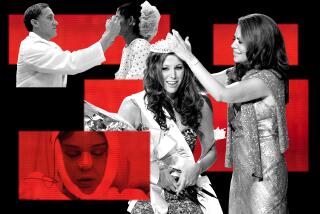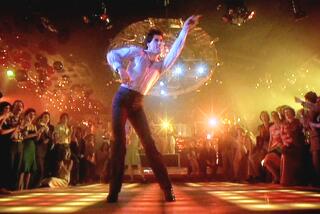A ‘Swan’ for the New Ages
Lots of people came to the American premiere of Matthew Bourne’s “Swan Lake” at the Ahmanson Theatre on Friday expecting the bare-chested male swans and satiric view of modern British royalty that have made the production a sensation since its London premiere in 1995: the centennial of the standard Petipa-Ivanov version of the Tchaikovsky classic.
However, the swans are no joke. In fact, Bourne’s secret weapon is intensity, and in its first three minutes alone his uniquely audacious and unforgettable reinterpretation delivers more of it than most traditional stagings generate in their whole first hour.
Showing us a boy’s nightmare of a swan in human form--and his mother’s unfeeling response--Bourne’s prologue emphasizes the feverish dread in the score and takes us deeply into the world of the key characters. By the time they reappear in that same bedroom at the very end, those characters and that score have served an untamed Romantic vision that may be Bourne’s greatest gift to contemporary dance.
Nineteenth century Romanticism, after all, was never merely winged sylphs or sprites flitting through the forest (an image that Bourne satirizes in a sensational comic ballet within the ballet), but rather a violent rejection of a corrupt status quo in favor of a passionate immersion in dreams, drugs, the irrational and the supernatural. Moreover, those enticing winged spirit-women were never Christians--which mattered tremendously to the century of the time. So the men attracted to such creatures risked losing more than just their lives.
*
Updating the story to his own lifetime, Bourne finds contemporary expressions of all the Romantic fixations listed above and brilliantly creates a sense of dangerous, forbidden love through the involvement of a troubled prince from the dysfunctional House of Windsor with one of the feral swans who materialize as he tries to drown himself in a city park.
As it happens, this prince has been dreaming about that swan all his life--an obsession that seems completely reasonable once you’ve seen Adam Cooper’s spellbinding performance as the feathered white swan and leathered black swan. Until very recently a principal in the Royal Ballet, the tall, charismatic Cooper dances with such authority and feeling that the traditional contrasts built into the most celebrated dual role in all ballet make a potent new statement about the duality of men: instinctual lover-protector versus promiscuous abuser-betrayer.
Cooper’s show-stopping entrance at the royal ball--taking the queen’s gloved hand and licking it as if it were a giant lollipop--both parodies the concept of public sexiness and drives it home with devastating force. Disarming the audience with humor represents a central Bourne strategy and here it darkens into a suite of ensemble dances about pawing the women in lascivious ways--plus an increasingly cruel Black Swan pas de deux ending in madness and death.
As the neurotic Prince, Scott Ambler must play the weakling in every scene: used, mocked and betrayed by almost everyone. But it is he who holds the ballet together by bridging its two worlds, a task Ambler accomplishes with a fierce quality of belief matched by strong dance skills. Some weakling.
One of the great dramatic dancers of our era, Lynn Seymour makes the queen less unyieldingly icy than Fiona Chadwick of the original cast and video edition, emerging as someone not incapable of the love her son desperately needs but fatally victimized by her own conflicts. A performance as bold and forceful as her most memorable Royal Ballet achievements.
(Ticket-holders should note that Seymour, Cooper and Ambler dance only half the performances each week. The rest belong to alternate principals, to be reviewed shortly in these pages.)
In secondary roles, Barry Atkinson (the Rothbart-ish Secretary), Emily Piercy (the Fergie-esque Girlfriend) and Andrew Walkinshaw (the helpless boy-prince) prove unfailingly expert and the rest of Bourne’s Adventures in Motion Pictures company dance with impressive spirit and versatility. The all-male swan corps? Scary, funny, terrific.
Leading a decent, 27-member orchestra in Rowland Lee’s resourceful new orchestrations, David Frame cannot produce the richness and heft of a larger ensemble, but he observes Tchaikovsky’s tempos more faithfully than most ballet conductors. For once, incidentally, the sequence of music in the last act respects the composer’s intentions.
An amazing spectacle by themselves, Lez Brotherston’s witty designs for sets and costumes offer something like a living museum of 20th century bad taste, though his most inspired effects come in the anti-nostalgic 19th century divertissement. Here the toe-shoed women not only have wings on their backs, but wings on their skirts and heads as well. In Bourne’s “Swan Lake,” however, it’s the men who really fly.
* “Swan Lake” runs through June 15 at the Ahmanson Theatre, Music Center, 135 N. Grand Ave. Tuesdays-Fridays, 8 p.m.; Saturdays and Sundays, 2 and 8 p.m. Added matinees: May 29, June 5, June 12. $15-$45 through April 30, $15-$60 afterward. (213) 628-2772.
More to Read
The biggest entertainment stories
Get our big stories about Hollywood, film, television, music, arts, culture and more right in your inbox as soon as they publish.
You may occasionally receive promotional content from the Los Angeles Times.










